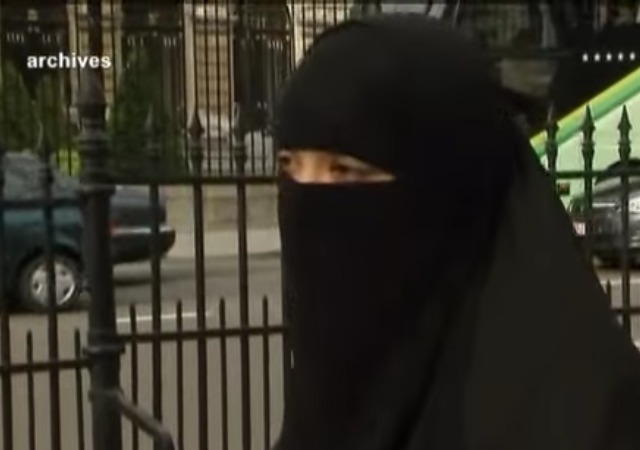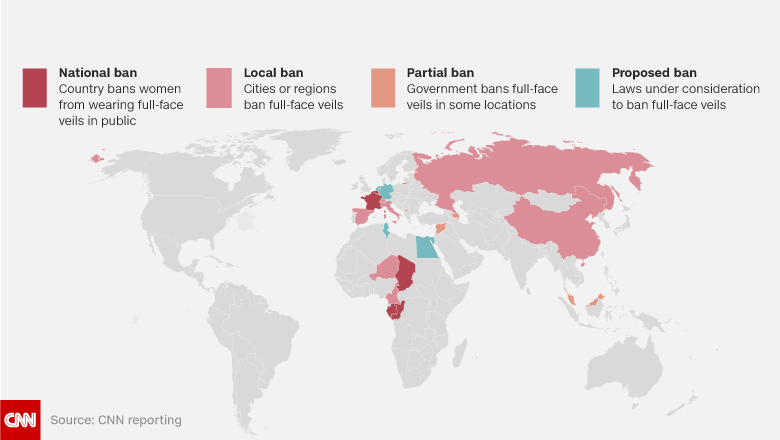The Rise of Burqa Bans
A question of assimilation

German Chancellor Angela Merkel recently suggested the banning in Germany of the full-face veil. The idea that a Western country such as Germany might have a right to make such laws, and to do so with motives other than racism, has certainly not been universally accepted. For example, a few days later this editorial about Merkel’s statement appeared in BloombergView:
Now, elections are coming up in Germany, and Merkel rightly wants to deny support to the far-right AfD party, whose anti-immigrant thinking is driven not by prudence but by outright racism. In response, Merkel’s newly hardened position is both weak on the merits and plain bad tactics.
…The effect of her statement is not to encourage assimilation, but merely to convey sympathy with the anti-immigrant worldview. Hence, bad tactics: Flattering such thinking is no way to overcome it…
Merkel has been a strong and compassionate leader of Germany and the European Union. No better candidate for the role has yet to come forward. Which makes it all the more disappointing to see her respond to anti-Muslim sentiment this way.
It is probably the case that some members of the “far-right” AfD party are indeed driven by “outright racism” (although “racism” wouldn’t be quite the right word, since we’re talking about a religion). But is it even a significant number? And is none of this attitude towards immigrants and the veil driven by “prudence”? Highly implausible.
We don’t know on what evidence the editors based their accusation about the completely racist motives of the AfD, because they aren’t saying; they just want the reader to accept their statement at face value. Here’s the AfD’s Wiki page, if you want to get up to speed.
And here is a video that seeks to answer the question of whether the AfD is racist. It was made by the BBC, which wouldn’t tend to favor a party on the right, but it doesn’t seem to find much evidence of “outright racism” in the people who are interviewed:
This party seems—at least as far as I can ascertain—to resemble other populist and nationalist movements that are springing up in a wide variety of places in response to the present governments’ ignoring of what seems like common sense about both unchecked immigration and its effect on a country’s cultural identity.
As for the substantive issue, wearing a facial veil is not dictated by Islam, and plenty of Muslim countries do without it. In addition, covering the face entirely has security consequences. This is the purpose of anti-mask laws that exist in various countries and that have to do with people covering their faces in any manner when in places of public assembly.
France has what is probably the most restrictive law of all in this respect:
The French ban on face covering is an act of parliament passed by the Senate of France on 14 September 2010, resulting in the ban on the wearing of face-covering headgear, including masks, helmets, balaclava, niqābs and other veils covering the face in public places, except under specified circumstances.
Here’s an article that includes the following map showing the face-veiling ban’s extent around the world:
Western countries—not just Germany—are struggling with questions of nationalism versus immigration. To what extent will a nation declare its own culture to be something with which immigrants must conform? What is the proper proportion of immigrants to natives in order to preserve a country’s own culture, and how many people even want to preserve that culture and consider it valid to preserve that culture? What is racism and what is common sense? How far can the left go in accusing people of blanket racism before the word becomes meaningless and causes a backlash (and has that point already arrived)? What form could that backlash take?
And it’s not just Western countries, either. Many Muslim countries have struggled with related cultural issues involving dress. When the Shah was in power in Iran, for example, the chador was banned, but it came back with a vengeance (literally) after 1979, along with theocracy.
And let’s not forget Turkey’s Ataturk:
The Ottoman Empire had a social system based on religious affiliation. The religious insignia extended to every social function. It was common to wear clothing that identified the person with their own particular religious grouping and accompanied headgear which distinguished rank and profession throughout the Ottoman Empire…
Beginning in 1923, a series of laws progressively limited the wearing of selected items of traditional clothing. Mustafa Kemal first made the hat compulsory to the civil servants. The guidelines for the proper dressing of students and state employees (public space controlled by state) was passed during his lifetime. After most of the relatively better educated civil servants adopted the hat with their own he gradually moved further. The Hat Law of 1925 introduced the use of Western style hats instead of the fez. Legislation did not explicitly prohibit veils or headscarves and focused instead on banning fezzes and turbans for men. Another control on the dress was passed in 1934 with the law relating to the wearing of ‘Prohibited Garments’. It banned religion-based clothing, such as the veil and turban, while actively promoting western-style attire.
The way we dress is not arbitrary, as any wearer of the burqa could tell you. The issues are not simply religious, either—they are cultural too, and they also have security implications in a world in which Islamic terrorism is an important and dangerous phenomenon even in Western nations, and masking the face masks the identity. This is not a small topic, nor is it a simple one, nor is it merely about racism.
[Neo-neocon is a writer with degrees in law and family therapy, who blogs at neo-neocon.]
 DONATE
DONATE
Donations tax deductible
to the full extent allowed by law.









Comments
One can’t see another body language when they are all covered up. It is more difficult to see if someone is lying or has contempt. It is an “us” verses “them” kind of thing and it creates intolerance. If the west is so immoral, then stay in those sharia countries. We are not the problem. In addition there are health issues with wearing all that fabric.
Islam is not a race.
I always wear a burqa when I go to my bank, just to f**k with Willis, the security guard. (I’m 6’5″, 250 lbs).
Immigration without assimilation is an invasion.
When will the liberal world come to its senses? Does anyone think that muslims will integrate into the society of their choosing if they refuse to allow their women to be free from such nonsense? The most disgusting part of this sharia veil law is that there are some muslim women who claim it is empowering to wear it! Maybe to save on the salon bill but in no other way. What it does is to keep them apart from the people they have chosen to live among. How do they ever become citizens of their new country with this barrier between them and their fellow citizens?
The sub-head, “a question of assimilation”, is exactly the wrong approach to this issue. Any proposal to ban burqas because they are “alien” or “offensive” is xenophobic and should not be tolerated by any decent person. But burqas should be banned for an entirely different reason — they are regularly used to commit crimes, and are thus a real and present danger to the public. Daniel Pipes has collected an astonishingly long list of crimes committed by the use of burqas in Philadelphia alone! And of course one of the 7/7 bombers got out of the country by wearing a burqa and using his sister’s passport. That is why they must be restricted in public, along with any similar costume, completely without reference to any cultural or religious factors. It shouldn’t matter whether the wearer is a Moslem woman, a nun, a Klansman, or just someone walking around on Purim or Halloween.
Any costume that conceals not only the entire face and figure, but also any large object that the person may be carrying, is a danger; conversely a costume that does not pose these dangers — such as a “burqini” — must be permitted and accepted, even if it’s just as alien and offensive to the majority culture.
“Any costume that conceals not only the entire face and figure, but also any large object that the person may be carrying, is a danger…”
Err… That argument could also be used to support banning baggy pants, sweatshirts and sweaters; trench coats and rain coats; even my old USAF-issue field jacket. You might want to rethink that a bit…
Um, no, none of those things do that.